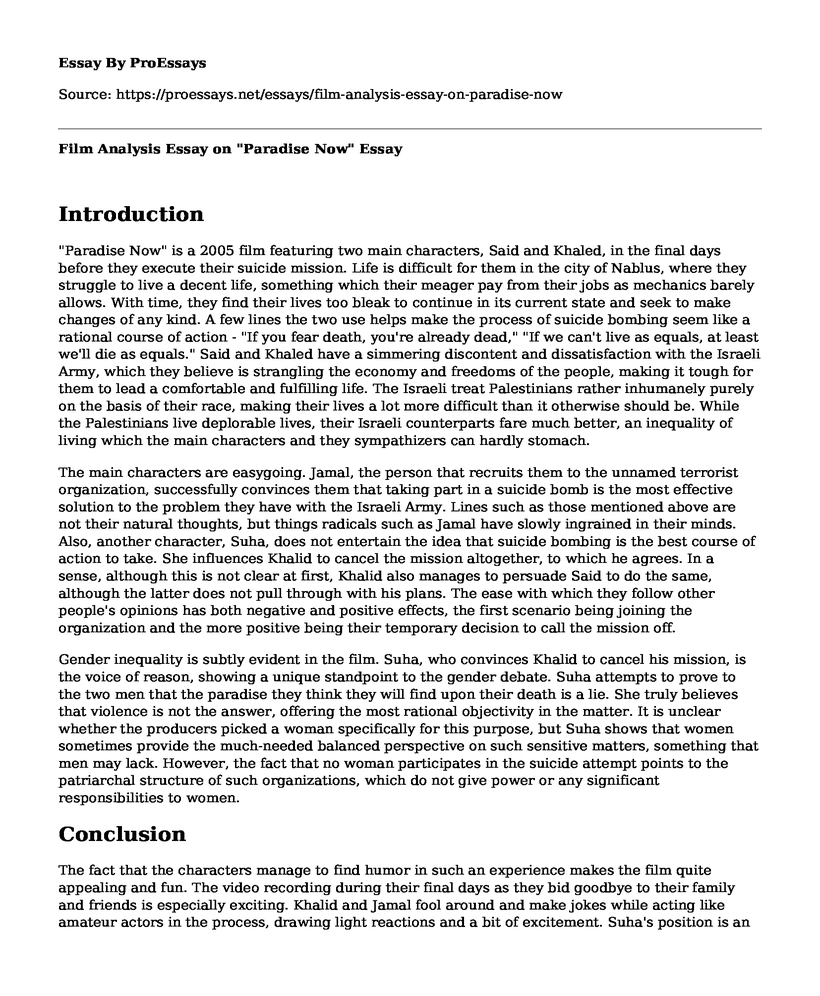Introduction
"Paradise Now" is a 2005 film featuring two main characters, Said and Khaled, in the final days before they execute their suicide mission. Life is difficult for them in the city of Nablus, where they struggle to live a decent life, something which their meager pay from their jobs as mechanics barely allows. With time, they find their lives too bleak to continue in its current state and seek to make changes of any kind. A few lines the two use helps make the process of suicide bombing seem like a rational course of action - "If you fear death, you're already dead," "If we can't live as equals, at least we'll die as equals." Said and Khaled have a simmering discontent and dissatisfaction with the Israeli Army, which they believe is strangling the economy and freedoms of the people, making it tough for them to lead a comfortable and fulfilling life. The Israeli treat Palestinians rather inhumanely purely on the basis of their race, making their lives a lot more difficult than it otherwise should be. While the Palestinians live deplorable lives, their Israeli counterparts fare much better, an inequality of living which the main characters and they sympathizers can hardly stomach.
The main characters are easygoing. Jamal, the person that recruits them to the unnamed terrorist organization, successfully convinces them that taking part in a suicide bomb is the most effective solution to the problem they have with the Israeli Army. Lines such as those mentioned above are not their natural thoughts, but things radicals such as Jamal have slowly ingrained in their minds. Also, another character, Suha, does not entertain the idea that suicide bombing is the best course of action to take. She influences Khalid to cancel the mission altogether, to which he agrees. In a sense, although this is not clear at first, Khalid also manages to persuade Said to do the same, although the latter does not pull through with his plans. The ease with which they follow other people's opinions has both negative and positive effects, the first scenario being joining the organization and the more positive being their temporary decision to call the mission off.
Gender inequality is subtly evident in the film. Suha, who convinces Khalid to cancel his mission, is the voice of reason, showing a unique standpoint to the gender debate. Suha attempts to prove to the two men that the paradise they think they will find upon their death is a lie. She truly believes that violence is not the answer, offering the most rational objectivity in the matter. It is unclear whether the producers picked a woman specifically for this purpose, but Suha shows that women sometimes provide the much-needed balanced perspective on such sensitive matters, something that men may lack. However, the fact that no woman participates in the suicide attempt points to the patriarchal structure of such organizations, which do not give power or any significant responsibilities to women.
Conclusion
The fact that the characters manage to find humor in such an experience makes the film quite appealing and fun. The video recording during their final days as they bid goodbye to their family and friends is especially exciting. Khalid and Jamal fool around and make jokes while acting like amateur actors in the process, drawing light reactions and a bit of excitement. Suha's position is an additional appealing element in the film, introducing a voice of reason from a woman's point of view. It changes the opinion of women, making their contribution more vital than otherwise might have been. It would, however, have improved the film if there was extra focus on religion, in addition to the struggles that the two young men experience. Although Suha and Said invoke it a bit, it is not a central point, making it appear less influential in their radical decisions than their daily struggles. The role of religion in the radicalization process would have benefited from more airplay.
Cite this page
Film Analysis Essay on "Paradise Now". (2022, Jun 23). Retrieved from https://proessays.net/essays/film-analysis-essay-on-paradise-now
If you are the original author of this essay and no longer wish to have it published on the ProEssays website, please click below to request its removal:
- Female in Art and Architecture - Essay Sample
- American Beauty Movie Review Paper Example
- Facebook and Impact on Global Economy Essay
- Research Paper on Unmasking the Consequences of Media Bias
- Stray Dog - Movie Analysis Essay
- Aubrey Drake Graham: Expressing Life Through Music and Poetry - Essay Sample
- Journey of Faith: Rodrigues & Garupe's Search for Truth - Essay Sample







